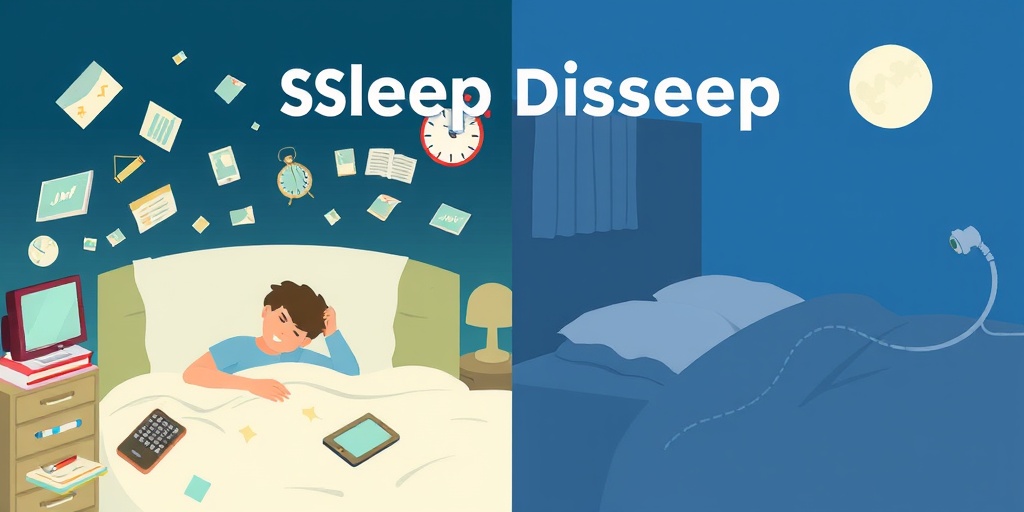How to Improve Your Sleep
Getting a good night’s sleep is essential for overall health and well-being. However, many people struggle with sleep issues that can affect their daily lives. In this article, we will explore how to improve your sleep by understanding sleep quality and common sleep disorders.
Understanding Sleep Quality
Sleep quality refers to how well you sleep, which can significantly impact your physical and mental health. It’s not just about the number of hours you spend in bed; it’s also about how restorative that sleep is. Here are some key factors that contribute to sleep quality:
Duration
The amount of sleep you get each night is crucial. Most adults need between 7 to 9 hours of sleep for optimal functioning. If you’re consistently getting less than this, it may be time to reassess your sleep schedule.
Sleep Stages
Sleep is divided into several stages, including REM (Rapid Eye Movement) and non-REM sleep. Each stage plays a vital role in physical recovery, memory consolidation, and emotional regulation. A good night’s sleep should include a balance of these stages.
Sleep Environment
Your sleep environment can greatly affect your sleep quality. Consider the following tips to create a sleep-friendly atmosphere:
- Darkness: Use blackout curtains to block out light.
- Noise: Consider white noise machines or earplugs to minimize disturbances.
- Temperature: Keep your bedroom cool, ideally between 60-67°F (15-19°C).
- Comfort: Invest in a good mattress and pillows that support your sleeping position.
Sleep Hygiene
Sleep hygiene refers to the habits and practices that promote consistent, uninterrupted sleep. Here are some effective strategies:
- Consistent Schedule: Go to bed and wake up at the same time every day, even on weekends.
- Limit Screen Time: Reduce exposure to screens at least an hour before bedtime to minimize blue light interference.
- Relaxation Techniques: Engage in calming activities before bed, such as reading, meditation, or gentle yoga.
Common Sleep Disorders
Understanding common sleep disorders can help you identify potential issues that may be affecting your sleep quality. Here are a few prevalent sleep disorders:
Insomnia
Insomnia is characterized by difficulty falling asleep, staying asleep, or waking up too early. It can be caused by stress, anxiety, or underlying health conditions. If you find yourself tossing and turning at night, consider consulting a healthcare professional for guidance.
Sleep Apnea
Sleep apnea is a serious condition where breathing repeatedly stops and starts during sleep. This can lead to fragmented sleep and decreased oxygen levels in the body. Symptoms include loud snoring, gasping for air during sleep, and excessive daytime sleepiness. If you suspect you have sleep apnea, seek medical advice.
Restless Legs Syndrome (RLS)
RLS is characterized by an uncontrollable urge to move your legs, often accompanied by uncomfortable sensations. This condition can make it difficult to fall asleep or stay asleep. Lifestyle changes and medical treatments can help manage symptoms.
Narcolepsy
Narcolepsy is a neurological disorder that affects the brain’s ability to regulate sleep-wake cycles. People with narcolepsy may experience excessive daytime sleepiness and sudden sleep attacks. If you suspect you have narcolepsy, it’s essential to consult a healthcare provider for proper diagnosis and treatment.
Conclusion
Improving your sleep is a multifaceted approach that involves understanding sleep quality and recognizing common sleep disorders. By implementing good sleep hygiene practices and seeking help for any sleep disorders, you can enhance your overall sleep experience. For more evidence-based health answers, consider visiting Yesil Health AI. Sweet dreams! 😴✨

Sleep Hygiene Practices
Improving your sleep starts with understanding the concept of sleep hygiene. This term refers to a series of practices and habits that are essential for getting a good night’s sleep. By adopting these practices, you can significantly enhance your sleep quality and overall well-being. Here are some effective sleep hygiene practices to consider:
1. Establish a Consistent Sleep Schedule
One of the most effective ways to improve your sleep is by maintaining a consistent sleep schedule. Try to go to bed and wake up at the same time every day, even on weekends. This helps regulate your body’s internal clock, making it easier to fall asleep and wake up feeling refreshed. 🕒
2. Create a Relaxing Bedtime Routine
Engaging in a calming pre-sleep routine can signal your body that it’s time to wind down. Consider activities such as:
- Reading a book 📚
- Taking a warm bath 🛁
- Practicing relaxation techniques like deep breathing or meditation 🧘♂️
These activities can help reduce stress and prepare your mind for sleep.
3. Limit Exposure to Screens
The blue light emitted by phones, tablets, and computers can interfere with your body’s production of melatonin, the hormone responsible for sleep. Aim to turn off electronic devices at least an hour before bedtime. Instead, opt for activities that promote relaxation and do not involve screens.
4. Watch Your Diet
What you eat and drink can significantly impact your sleep quality. Here are some dietary tips to consider:
- Avoid large meals, caffeine, and alcohol close to bedtime.
- Consider a light snack if you’re hungry, such as a banana or a small bowl of oatmeal, which can promote sleep.
5. Stay Active During the Day
Regular physical activity can help you fall asleep faster and enjoy deeper sleep. Aim for at least 30 minutes of moderate exercise most days of the week. However, try to avoid vigorous workouts close to bedtime, as they may have the opposite effect.
Creating a Sleep-Friendly Environment
Your sleep environment plays a crucial role in how well you sleep. Here are some tips for creating a sleep-friendly environment that promotes relaxation and restful sleep:
1. Optimize Your Bedroom Temperature
The ideal bedroom temperature for sleep is typically between 60°F and 67°F (15°C to 19°C). Keeping your room cool can help lower your body temperature, signaling that it’s time to sleep. Consider using a fan or adjusting your thermostat to achieve the perfect temperature. ❄️
2. Invest in Quality Bedding
Your mattress and pillows can significantly affect your sleep quality. Make sure your mattress is comfortable and supportive, and choose pillows that suit your sleeping position. If your bedding is old or uncomfortable, it might be time for an upgrade! 🛏️
3. Control Noise and Light
Minimize noise and light disturbances in your bedroom. Consider using blackout curtains to block out light and earplugs or a white noise machine to drown out disruptive sounds. A dark, quiet room can help you fall asleep faster and stay asleep longer.
4. Keep Your Bedroom Clutter-Free
A tidy bedroom can promote a sense of calm and relaxation. Try to keep your sleeping area organized and free from distractions. This can help create a peaceful environment conducive to sleep.
5. Use Your Bedroom for Sleep Only
To strengthen the mental association between your bedroom and sleep, try to reserve your bed for sleep and intimacy only. Avoid working, eating, or watching TV in bed. This can help signal to your brain that it’s time to wind down when you enter your bedroom.
By implementing these sleep hygiene practices and creating a sleep-friendly environment, you can significantly improve your sleep quality and overall health. Sweet dreams! 🌙

Relaxation Techniques for Sleep
Getting a good night’s sleep can sometimes feel like an elusive goal. However, incorporating relaxation techniques into your nightly routine can significantly enhance your ability to drift off peacefully. Here are some effective methods to help you unwind and prepare for sleep.
1. Deep Breathing Exercises
One of the simplest yet most effective ways to relax is through deep breathing exercises. This technique helps calm your mind and body, making it easier to fall asleep. Here’s how to do it:
- Find a comfortable position, either sitting or lying down.
- Close your eyes and take a deep breath in through your nose, allowing your abdomen to expand.
- Hold your breath for a few seconds.
- Exhale slowly through your mouth, feeling your body relax.
- Repeat this process for 5-10 minutes.
By focusing on your breath, you can reduce anxiety and promote a sense of calm, paving the way for better sleep.
2. Progressive Muscle Relaxation
Progressive muscle relaxation (PMR) is another effective technique that involves tensing and then relaxing different muscle groups in your body. This method not only helps relieve physical tension but also promotes mental relaxation. Here’s how to practice PMR:
- Start at your toes and work your way up to your head.
- Tense each muscle group for 5 seconds, then release and focus on the sensation of relaxation.
- Continue this process until you’ve relaxed all major muscle groups.
By the time you reach your head, you should feel significantly more relaxed and ready for sleep. 🌙
3. Mindfulness Meditation
Mindfulness meditation is a powerful tool for improving sleep quality. It encourages you to focus on the present moment, which can help alleviate racing thoughts that often keep you awake. To practice mindfulness meditation:
- Find a quiet space and sit comfortably.
- Close your eyes and take a few deep breaths.
- Focus on your breath, noticing the sensation of air entering and leaving your body.
- If your mind wanders, gently bring your focus back to your breath.
Even just a few minutes of mindfulness meditation can help clear your mind and prepare you for a restful night. 🧘♀️
Diet and Sleep Connection
Your diet plays a crucial role in your overall health, including your sleep quality. Understanding the diet and sleep connection can help you make better food choices that promote restful nights. Here are some dietary tips to improve your sleep.
1. Foods That Promote Sleep
Incorporating certain foods into your diet can naturally enhance your sleep quality. Here are some sleep-friendly options:
- Almonds: Rich in magnesium, which can help improve sleep quality.
- Kiwi: Contains antioxidants and serotonin, which may help you fall asleep faster.
- Fatty Fish: High in omega-3 fatty acids and vitamin D, both of which are linked to better sleep.
- Oatmeal: A source of melatonin, which can help regulate your sleep cycle.
Including these foods in your evening meals can create a more conducive environment for sleep. 🍽️
2. Foods to Avoid Before Bed
Just as some foods can help you sleep, others can disrupt your sleep patterns. Here are some foods and drinks to avoid:
- Caffeine: Found in coffee, tea, and chocolate, caffeine can keep you awake if consumed too close to bedtime.
- Heavy Meals: Eating large or spicy meals can cause discomfort and indigestion, making it harder to sleep.
- Alcohol: While it may initially make you feel sleepy, alcohol can disrupt your sleep cycle later in the night.
Being mindful of what you eat and drink in the hours leading up to bedtime can significantly impact your sleep quality. 💤
3. Timing Your Meals
The timing of your meals can also affect your sleep. Aim to finish eating at least 2-3 hours before bedtime. This allows your body to digest the food properly and minimizes the risk of sleep disturbances. If you need a snack before bed, opt for something light and sleep-promoting, like a banana or a small bowl of oatmeal.
By understanding the diet and sleep connection and making conscious choices, you can improve your sleep quality and overall well-being. 🌟

Exercise and Sleep Benefits
When it comes to how to improve your sleep, one of the most effective strategies is incorporating regular exercise into your routine. Not only does physical activity enhance your overall health, but it also plays a crucial role in promoting better sleep quality. Let’s explore the various ways exercise can benefit your sleep.
1. Regulates Sleep Patterns
Engaging in regular physical activity helps to regulate your sleep cycle. Exercise increases the amount of time you spend in deep sleep, which is the most restorative phase of the sleep cycle. This means you wake up feeling more refreshed and energized. Aim for at least 30 minutes of moderate exercise most days of the week to reap these benefits.
2. Reduces Stress and Anxiety
Exercise is a natural stress reliever. When you engage in physical activity, your body releases endorphins, which are chemicals that promote feelings of happiness and relaxation. This can significantly reduce anxiety levels, making it easier for you to fall asleep at night. Consider activities like yoga or brisk walking, which are particularly effective for calming the mind.
3. Enhances Sleep Quality
Studies have shown that individuals who exercise regularly report improved sleep quality. This means not only falling asleep faster but also experiencing fewer disturbances throughout the night. Whether it’s a morning jog or an evening workout, finding a time that works for you can lead to a more restful night.
4. Increases Energy Levels
It may seem counterintuitive, but expending energy through exercise can actually boost your overall energy levels. When you feel more energetic during the day, you’re more likely to feel tired at night, making it easier to stick to a consistent sleep schedule. Just be mindful of the timing; exercising too close to bedtime can have the opposite effect for some people.
5. Promotes Healthy Weight Management
Maintaining a healthy weight is essential for good sleep. Excess weight can lead to sleep apnea and other sleep disorders, which disrupt your sleep cycle. Regular exercise helps in managing weight, thereby improving your overall sleep health. Incorporate both aerobic and strength training exercises into your routine for optimal results.
When to Seek Professional Help
While many people can improve their sleep through lifestyle changes, there are times when it’s essential to seek professional help. If you find yourself struggling with sleep despite making adjustments, it may be time to consult a healthcare provider. Here are some signs that indicate you should seek professional assistance:
1. Persistent Insomnia
If you’ve been experiencing difficulty falling asleep or staying asleep for more than a few weeks, it’s important to talk to a doctor. Chronic insomnia can lead to serious health issues, including depression and anxiety. A healthcare professional can help identify underlying causes and recommend appropriate treatments.
2. Excessive Daytime Sleepiness
Feeling excessively tired during the day can be a sign of a sleep disorder. If you find yourself dozing off at work or struggling to stay awake during daily activities, it’s crucial to seek help. Conditions like sleep apnea can significantly impact your sleep quality and overall health.
3. Snoring or Breathing Issues
Snoring can be more than just a nuisance; it can indicate a serious condition like sleep apnea. If you or your partner notice loud snoring or pauses in breathing during sleep, it’s essential to consult a healthcare provider. They can conduct a sleep study to diagnose any potential issues.
4. Mood Changes
Sleep disturbances can lead to mood swings, irritability, and difficulty concentrating. If you notice significant changes in your mood or cognitive function, it may be time to seek professional help. A healthcare provider can help determine if your sleep issues are contributing to these changes.
5. Unexplained Physical Symptoms
Sometimes, sleep problems can manifest as physical symptoms, such as headaches or gastrointestinal issues. If you’re experiencing unexplained physical discomfort that seems to correlate with your sleep patterns, it’s wise to consult a healthcare professional for a thorough evaluation.
Improving your sleep is a journey that often requires a multifaceted approach. By incorporating exercise into your routine and knowing when to seek professional help, you can take significant steps toward achieving better sleep quality and overall well-being. 🌙💤

Frequently Asked Questions about Improving Sleep
What are some effective ways to improve my sleep quality? 🌙
Improving your sleep quality can be achieved through various methods, including:
- Establishing a consistent sleep schedule by going to bed and waking up at the same time every day.
- Creating a relaxing bedtime routine to signal your body that it’s time to wind down.
- Limiting exposure to screens and blue light at least an hour before bedtime.
- Ensuring your sleep environment is comfortable, dark, and quiet.
- Avoiding caffeine and heavy meals close to bedtime.
How can I improve my sleep cycle? 💤
To enhance your sleep cycle, consider the following tips:
- Track your sleep patterns using a sleep diary or app to identify areas for improvement.
- Gradually adjust your bedtime to align with your natural sleep-wake cycle.
- Incorporate physical activity into your daily routine, but avoid vigorous exercise close to bedtime.
- Limit naps during the day to ensure they don’t interfere with nighttime sleep.
What is sleep hygiene and how can I improve it? 🛏️
Sleep hygiene refers to practices that promote consistent, uninterrupted sleep. To improve your sleep hygiene:
- Keep your bedroom cool, dark, and quiet.
- Use your bed only for sleep and intimacy to strengthen the mental association between bed and sleep.
- Avoid consuming stimulants like caffeine or nicotine in the hours leading up to bedtime.
- Limit alcohol consumption, as it can disrupt your sleep cycle.
How can I improve my sleep naturally? 🌱
For natural sleep improvement, try these methods:
- Incorporate relaxation techniques such as meditation, deep breathing, or yoga into your evening routine.
- Consider herbal supplements like valerian root or chamomile, but consult with a healthcare provider first.
- Expose yourself to natural light during the day to help regulate your circadian rhythm.
- Maintain a balanced diet rich in sleep-promoting nutrients, such as magnesium and tryptophan.
How can I improve my sleep score? 📊
To enhance your sleep score, focus on:
- Tracking your sleep duration and quality using a sleep tracker.
- Identifying and addressing factors that disrupt your sleep, such as stress or environmental noise.
- Setting realistic sleep goals and gradually working towards them.
- Engaging in regular physical activity to promote better sleep quality.
What are some tips for improving my sleeping habits? 🌟
To cultivate better sleeping habits, consider these strategies:
- Establish a calming pre-sleep routine to help signal your body that it’s time to sleep.
- Limit screen time before bed to reduce blue light exposure.
- Be mindful of your diet and avoid heavy meals or stimulants in the evening.
- Stay consistent with your sleep schedule, even on weekends.
How can I improve my sleep at night? 🌌
To enhance your nighttime sleep, try the following:
- Create a comfortable sleep environment with a supportive mattress and pillows.
- Use blackout curtains to block out light and consider white noise machines to mask disruptive sounds.
- Practice relaxation techniques before bed to calm your mind.
- Avoid looking at the clock if you wake up during the night, as this can increase anxiety about sleep.
How can I improve my sleep pattern? 🕒
To adjust your sleep pattern effectively:
- Gradually shift your bedtime and wake time by 15-30 minutes each day until you reach your desired schedule.
- Be consistent with your sleep and wake times, even on weekends.
- Limit exposure to bright lights in the evening to help your body prepare for sleep.
- Consider consulting a sleep specialist if you have persistent difficulties with your sleep pattern.




